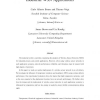Free Online Productivity Tools
i2Speak
i2Symbol
i2OCR
iTex2Img
iWeb2Print
iWeb2Shot
i2Type
iPdf2Split
iPdf2Merge
i2Bopomofo
i2Arabic
i2Style
i2Image
i2PDF
iLatex2Rtf
Sci2ools
142
click to vote
TII
2010
2010
The Impact of Temperature on Outdoor Industrial WSN Applications
The industrial world is currently considering the adoption of Wireless Sensor Networks (WSN) for industrial process and control applications. However, when using wireless sensor networks in such application scenarios, network performance, reliability, and robustness must be ensured with high degrees of precision. In this paper we study an outdoor deployment of a wireless sensor network in an oil refinery. We investigate the influence of temperature variations and mandatory ATEX casing on data delivery performance. Our experimental evaluation shows the impact that high temperature variations, such as the ones expected at the deployment location, have on network performance. We further show how the design and the deployment of wireless sensor networks in such application scenarios is influenced by temperature, and how less energy is needed to ensure reliable communications during night.
| Added | 22 May 2011 |
| Updated | 22 May 2011 |
| Type | Journal |
| Year | 2010 |
| Where | TII |
| Authors | Carlo Alberto Boano, James Brown, Nicolas Tsiftes, Utz Roedig, Thiemo Voigt |
Comments (0)

